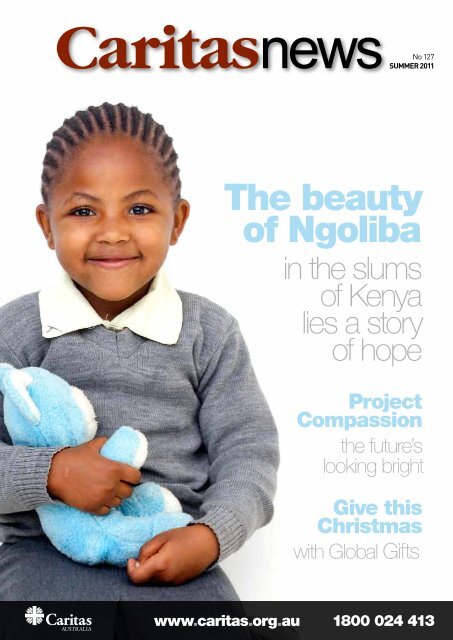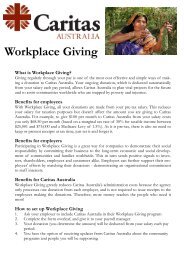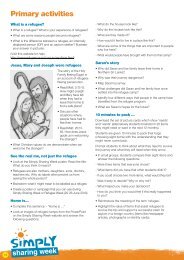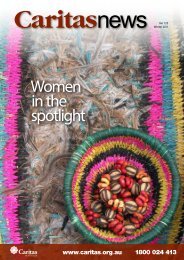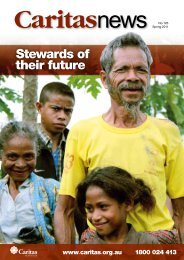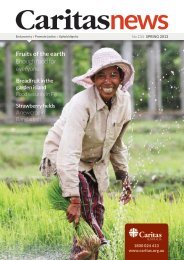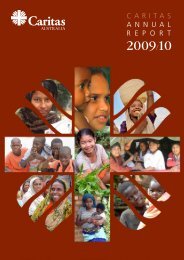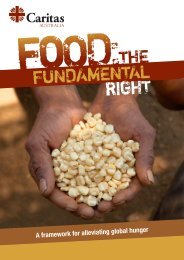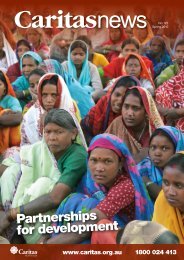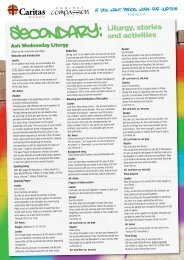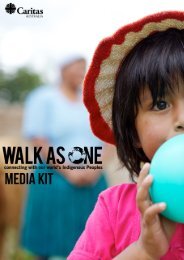The beauty of Ngoliba - Caritas Australia
The beauty of Ngoliba - Caritas Australia
The beauty of Ngoliba - Caritas Australia
- No tags were found...
You also want an ePaper? Increase the reach of your titles
YUMPU automatically turns print PDFs into web optimized ePapers that Google loves.
global GIFTSExperience the Joy <strong>of</strong> GivingChristmas is only weeks away.Give a gift with a difference andmake your giving meaningful.As Jesus is God’s gift to the world, so you can enterthe Spirit <strong>of</strong> Christmas by giving to those who haveless. Choose from nine meaningful Global Gifts:1. Choose a gift1. For $10 you could provideClean Water to a community ina country like Vanuatu.lto make givingle communities atwonderful Globalter and a Healthyency Relief. Eacherence to the livestire communitieswards your chosenifully presented cardxplains how youtheir behalf. This alsornament which canpt for the future.al Giftsh to purchasereturning it in theely you can order024 413, or onlinegiftsitas <strong>Australia</strong>.y. Orders shouldth to arrive in time2. For $20 you could provide aHealthy Meal to nourish ahungry family in a country suchas Uganda.Change the worldthis Christmas –give A Global Gift3. For $25 you could provideHIV/AIDS Treatment and helpsomeone live positively withintheir community.<strong>Caritas</strong> <strong>Australia</strong> focuses on building strongercommunities and this year’s Global Gifts representmany <strong>of</strong> the aspects <strong>of</strong> this work.We believe that by addressing these issues in arespectful and enhancing way, we are ensuringa better future is built for the world’s mostmarginalised people.4. For $35 you could provideSustainable Agriculture t<strong>of</strong>armers so they can produceecologically sustainable crops.5. For $50 you could provideTrauma Counselling support tovictims <strong>of</strong> gender-based violence.6. For $65 you could providea Sustainable Future byprotecting the fresh watersupply and environment in aplace like Kiribati.7. For $75 you could provide aSafe Childbirth and save thelives <strong>of</strong> many women and theirbabies in a country such asBangladesh.8. For $100 you could provideEducation and incomegeneratingskills for women incountries such as Laos.9. For $200 you could provideEmergency Relief (food, water,shelter and medical support) tothose in need <strong>of</strong> urgent support.90mmspecscolour:size: 95 x 90mm, diecut, dri lhole, 2 pieces, 2 sidessign<strong>of</strong>fPMS 1807Cname: date:GlobalGiftsIMPORTANT: Coloursrepresented here are notaccurate to the finalproduction process.Colours CAN NOT bereplecated 100%accurately to anyproduction process.Client should see andsign <strong>of</strong>f on a printedproo from the printer.3. Changepeople’slivesaroundthe globe95mm 95mmFRONT BACKdrill hole(DO NOT PRINT)2. Receivea card anda Christmasornament togive to yourloved one<strong>The</strong> Catholic Agencyfor International Aidand DevelopmentThis Christmas, makeyour giving meaningful.www.caritas.org.au/globalgiftsGlobal Giftswww.caritas.org.au/globalgiftsSee back cover to order yourGlobal GiftsPMS 1807C has been selected as the spot colour.Please be sure to see a PANTONE swatch bookand aprove the colour before printing. Please be surethat the printer explains how that colour will behaveon the paper stock that you choose.dieline(DO NOT PRINT)Explore a new way <strong>of</strong> givingExperience the true meaning <strong>of</strong> Christmas and make a world <strong>of</strong> difference to people’s lives.summer 2011 | 3
A Story<strong>of</strong> HopeIn the slums <strong>of</strong> Kenya, Jakki Travers,Relationship Coordinator at <strong>Caritas</strong> <strong>Australia</strong>discovered a wonderful story <strong>of</strong> hope.enya is definitely a land <strong>of</strong>contrasts. Head to downtownNairobi, one <strong>of</strong> the largestcities in Africa, and you’ll witness highrise buildings, clean wide streets andsidewalks. An international city; it isfilled with well-heeled locals and touristsdrinking lattes in Java House or sippingbeers while watching satellite TV in themany bars and restaurants.Head to the northeast and it’s acompletely different story. Only 11kilometres away from the city liesKorogocho slum, one <strong>of</strong> the largest slumsin Nairobi. A seething mass <strong>of</strong> humanity;approximately 200,000 people arepacked like sardines into an area roughly1.5 square kilometres in size.Adjacent to the Korogocho slum isthe Dandora Dump. Every year <strong>Caritas</strong><strong>Australia</strong>’s partner, Pendekezo Letu (PKL)helps many young street girls found(mostly) at Dandora.Before I could visit these areas, my firststop was Kariobangi Catholic Church(on the outskirts <strong>of</strong> Korogocho) whereI had to pick up armed guards. I feltslightly apprehensive as I was put in theback seat with an armed guard on eitherside <strong>of</strong> me!Dandora DumpAs we drove into the slum, the further wetravelled, the narrower, dirtier and busierthe roads became. We parked the ute andwalked over the river to Dandora Dumpwhere vultures and Marabou Storkscircle the sky searching for carcasses toscavenge; and plumes <strong>of</strong> smoke rise fromrotting garbage.Every day 2,000 tonnes <strong>of</strong> fresh garbagefrom all over Nairobi are dumped here.<strong>The</strong>re are no restrictions on dumping,so domestic, agricultural and medicalwastes are dumped together. And everyday local men, women and children,some as young as two or three years old,search for food, recyclables and anythingelse they can find to sell.As the young children search, theyare pecked by the scavenging birdsand knocked over by the resident pigscompeting for the fresh-ish food thrownout by nearby Nairobi residents.I felt so guilty that I, a middle-aged,middle-<strong>of</strong>-the-road woman from<strong>Australia</strong>, needed an armed guard toprotect me there, and yet these younggirls have no one to watch over them.<strong>The</strong>y are at risk <strong>of</strong> needle stick injuriesand disease, and are <strong>of</strong>ten attacked andsexually assaulted by the older boys. As amother <strong>of</strong> teenage daughters I saw clearlyjust how vulnerable they are, and it ishere in the midst <strong>of</strong> despair that I alsostarted to see their story <strong>of</strong> hope.Thanks to your support, every yearPKL is able to help many <strong>of</strong> these girls.For 10 months each year, a group <strong>of</strong>100 girls, with their families support,are hand-picked by PKL’s social workersto live in PKL’s residential home,<strong>Ngoliba</strong>, where they learn basic lifeskills and receive intensive counsellingand remedial education.<strong>The</strong> Beauty <strong>of</strong> <strong>Ngoliba</strong>My next stop was <strong>Ngoliba</strong>, a 90-minutecar ride from Dandora. When I arrivedI was immediately struck by the <strong>beauty</strong><strong>of</strong> the house, the gardens, the freshair and the happy smiling faces <strong>of</strong> thegirls. What a contrast to where thesegirls had come from! <strong>The</strong>ir smiles werewonderful to see, but I know there ismuch heartache behind them.Just a few months earlier these girlswere looking for food to eat and itemsto sell. Now they are learning to meettheir own needs by cleaning the dorms“When I returned to Sydney, Ireceived word that one <strong>of</strong>our bequestors, Miss MonicaMangan from WilliamstownVictoria, had passed away. Along-term, generous supporter<strong>of</strong> <strong>Caritas</strong>, Monica left a bequestso we can continue our work inAfrica. Thank you, Monica.”4 |
“As a mother <strong>of</strong> teenagedaughters I saw clearly justhow vulnerable they are,and it is here in the midst <strong>of</strong>despair that I also started tosee their story <strong>of</strong> hope”In May 1997, the Pendekezo Letu (PKL) programbegan as a short-term program to rehabilitateyoung street girls and <strong>of</strong>fer support to theirfamilies. It is now a wide-ranging programdefending the rights <strong>of</strong> vulnerable childrenand their families in Kenya; providing legal aidservices for victims <strong>of</strong> child abuse, child rightstraining, skills training for teenagers livingin the slums, and providing essential outreachservices for people living with HIV/AIDs.Every day 2,000 tonnes <strong>of</strong> freshgarbage from all over Nairobiare dumped in Dandora Dump.and bathrooms, washing and hangingout their own sheets and clothes, andbaking bread and making food.When it was time for school, I headedinto the classrooms to see the girlseagerly awaiting their lessons. <strong>The</strong>y satat the wooden school desks with theirbooks open and pens poised in theirhands. <strong>The</strong> three classrooms – junior,middle and senior – are all taught byteachers who are passionate abouttheir work, and it made me smile tosee the walls lined with world maps,respiratory system diagrams and SuperMario cartoons.Some <strong>of</strong> the students were alsoteenage mothers, and at <strong>Ngoliba</strong> theyare taught hairdressing and <strong>beauty</strong>skills. In the <strong>beauty</strong> salon, I was <strong>of</strong>fereda massage and manicure, and reallyfancied taking them up on their <strong>of</strong>fer!When my day drew to a close I wasgiven a performance by each class. <strong>The</strong>girls sang and danced, but the messagesin their songs made me want to cry.Young girls shouldn’t have to singabout child protection and HIV/AIDS– but I understand that it’s a reality inKenya, and pleased that PKL is helpingthem learn and understand more aboutthe situation.Life after <strong>Ngoliba</strong>After 10 months at <strong>Ngoliba</strong>, the girlswill go back to their families andcommunities where they will return toschool. Older family members will beprovided trades training, business andhousing loans, assistance to relocateaway from the urban slums and backto their rural homes (if possible), acounselling service and health care forthose living with HIV/AIDS.For more on PKL, head towww.caritas.org.au/PKLIf you would like to receiveinformation about bequests, pleasecontact Jakki on 02 8306 3449 orJakkiT@caritas.org.ausummer 2011 | 5
Helping PakistanFlood SurvivorsWhen massive floods engulfed many regions <strong>of</strong> Pakistan insummer 2010, existing water and electrical systems werebrought down. <strong>Caritas</strong>’ partner in Pakistan, Catholic ReliefServices (CRS), has built or repaired water systems thatserve thousands <strong>of</strong> people. CRS is also creating a small,water-fed power plant to bring electricity to remote areas.A rope trolley was used tocross this raging river.Engineer Abdul Rashid, SeniorTechnical Advisor for CRS Pakistan, spokeabout the project while in Besham, a cityin mountainous northern Pakistan.What engineering projects areCRS doing to help people hurt bythe flood?CRS is repairing broken water systems sopoor people have clean water to drink.Even high up in the mountains wherethe floodwaters couldn’t reach, the rainswere so severe that the pipe systems weredestroyed.CRS has also repaired bridges, pathways,and irrigation channels. We’ve built orrepaired more than 100 systems.It’s very steep and mountainous,and the roads are bad. How doyou get construction materialsto project sites?<strong>The</strong>re are some roads, but many are verybad. Landslides covered many parts <strong>of</strong>the main road during the flood. With thewater supply schemes we’ve built in someplaces, we had to use donkeys, or mencarried pipes on foot.You’re also working on a small,water-fed power plant. What isthe situation with electricity inPakistan?In all <strong>of</strong> Pakistan there is a problemwith getting electricity. In the mountainvillages, there are few electrical lines. Evenwhen there are power lines, there’s rarelyelectricity. And even when there is current,the voltage is so low that it cannot runthings like fans and refrigerators.Poor people cannot afford the bills. Ittypically costs 2,000 rupees per month(over $20) and the rate is going up.Lighting is a basic need, so people usekerosene oil lamps.What is a microhydropowerplant (MHP)?It’s an electrical power plant with asmall capacity: 5 to 100 kilowatts perunit. Before the flood, there were a lot <strong>of</strong>MHPs. But most <strong>of</strong> them were washedaway. Only 20 percent <strong>of</strong> people haverecovered that power.Most <strong>of</strong> the MHPs were owned byindividuals. <strong>The</strong> owner would haveadditional electricity, so he would sell itto other people at 200 rupees per monthper household. CRS is implementingcommunal schemes. <strong>The</strong> plant will helpan average <strong>of</strong> 200 to 400 households.Households here are very large, asextended families live together.How does an MHP work?For example, imagine I have a onepoundweight and drop it 10 feet. It willhave some energy and power. If I dropit from a hundred feet, it will have morepower. <strong>The</strong> water comes down the steepmountains. In the winter there’s snow, sowhen it melts, it flows into streams. <strong>The</strong>water falls on a turbine and the turbinerotates. It’s connected to a generator,which creates the electricity.What is most difficult aboutbuilding this plant?On the plus side, there’s a lot <strong>of</strong> water inthis area. <strong>The</strong> essentials are quantity <strong>of</strong>water and elevation, and we’ve got bothin this area. Before the floods, there werea lot <strong>of</strong> sites where we could constructthese MHPs. After the flood, most <strong>of</strong> theSevere flooding swept awayhomes and land.Pakistani flood survivors carryfood on a destroyed road.sites have been destroyed, so now wehave fewer choices.How are these projects helpingpeople?Before we fixed the water systems, peoplewere collecting water from a nearbysource, but that could be three milesaway. Women are responsible for gettingthe water, carrying it in a big pot on theirheads. It’s hard.People really appreciate CRS staff – wewere the first ones who went to thesecommunities and provided the basicnecessities <strong>of</strong> life.photos: Catholic Relief Services (CRS)6 |
A Community <strong>of</strong> caritasA Very Special Meeting<strong>Caritas</strong>news caught up with Andree Rice,National Council Member, to find out moreabout meeting the Prime Minister, Julia Gillard.On Thursday 1 September, a fiveperson<strong>Caritas</strong> Qld delegation waschosen to meet the Prime Minister at apublic community forum held at YerongaState High School.<strong>The</strong> group was made up <strong>of</strong> AndreeRice, National Council Member, <strong>Caritas</strong><strong>Australia</strong>; Amelia Sumner, Justice andDemocracy Captain, Brigidine College;Tricia Ryan, Regional EngagementCoordinator, <strong>Caritas</strong> Qld; Claire Proberts,Senior Years Coordinator, EmmausCollege; Jenifer Byrne, Global EducatorAdviser, <strong>Caritas</strong> Qld.“<strong>The</strong> experience was overwhelminglypositive,” said Andree. “Ms Gillard waspersonable and particularly interested insocial justice and issues <strong>of</strong> internationaldevelopment pertaining to women.”In July, <strong>Caritas</strong> <strong>Australia</strong>’s EducationTeam participated as a major partnerin Edmund Rice Education <strong>Australia</strong>’s(EREA) ‘Partnering for a Better World’Immersion conference in Melbourne.Pacific Program Group Leader, JustineMcMahon, gave a keynote addresson <strong>Caritas</strong> <strong>Australia</strong>’s approach tointernational development and oureducation staff-led workshops.<strong>The</strong> conference drew together 150educators from all over <strong>Australia</strong>. OverAndree thanked the Prime Ministerfor her government’s robustcommitment to international aid andfor initiating the Aid EffectivenessReview. “I also commented that <strong>Caritas</strong>believes the most effective aid is peopleandpartner-centred and focuses onqualitatively improving the outcomes<strong>of</strong> the poorest <strong>of</strong> the poor in our world.“Ms Gillard seemed genuinelypositive and very happy to talk with us.<strong>The</strong> meeting provided a fine example<strong>of</strong> female leadership to all <strong>of</strong> us, andthe entire process demonstratedwhat democracy in action reallylooks like. <strong>The</strong> chance to talk one-ononewith your country’s leader is aprivilege rarely enjoyed by most <strong>of</strong> theworld’s population.”“Ms Gillard was particularly interested in social justice andissues <strong>of</strong> international development pertaining to women”Left to right: Claire Proberts, Tricia Ryan, Julia Gillard PM, Amelia Sumner, Jenifer Byrne and Andree Rice.Partnering for a Better Worldtwo days the participants listened to<strong>Australia</strong>n and internationalspeakers, either in person or viavideo-conferencing, and togetherexplored aspects <strong>of</strong> education forjustice and discussed best practice forconducting immersions.<strong>Caritas</strong> <strong>Australia</strong>’s contributionwas well-received and the conferenceprovided the education team with avaluable opportunity for networkingand pr<strong>of</strong>essional development.A Just ClimateMessage ReachesParliament HouseOn Tuesday 20 September, AlexandraEngel, <strong>Caritas</strong> <strong>Australia</strong> CampaignsCoordinator, and Kateia Kaikai <strong>of</strong> the PacificCalling Partnership met with ClimateChange Minister Greg Combet to presenthim with A Just Climate petition signaturescollected from around the country.<strong>The</strong>y discussed the importance <strong>of</strong>improving financial and technicalassistance to developing countries, andsupporting innovative finance mechanismsto source the funds urgently needed totackle changes to climate.“We thanked the Minister for the stepsthe government has already taken, andreinforced our view that the world’spoorest must be at the heart <strong>of</strong> theconversation about changes to climatein <strong>Australia</strong>,” said Alexandra.Kateia, who arrived from Kiribati justthree months ago, shared her story withthe Minister. “I have seen the damage thatsea water intrusion and changes in weatherhas already had on people’s crops andlivelihoods in my country.“When people’s usual source <strong>of</strong> income,for example coconuts, fails because <strong>of</strong> thechanges in climate, then they must findothers ways to earn money... I have seensome young women who need to enterprostitution with passing fishing boats sothat they can support their families, becausethey have no other way to earn the incomeand become desperate,” she said.“It is the poorest and most marginalisedcommunities, like Kiribati, who will be hithardest by changes to climate, so we mustensure <strong>Australia</strong> takes a leadership rolein assisting developing countries to fightpoverty and develop in sustainable ways,”added Alexandra.Left to right: Kateia Kaikai, AlexandraEngel and Greg Combet.summer 2011 | 9
ReportSupporter SurveyThank you for takingpart in our supportersurvey. Over 700people responded*.Your feedback will helpus better understandwhat motivates youto support <strong>Caritas</strong><strong>Australia</strong>, and whatinspires you aboutout work. Here is asnapshot <strong>of</strong> results:<strong>The</strong> top two topics youare most interestedin are:1. Water & Sanitation2. Education & Development<strong>The</strong> top two geographicalareas you are mostinterested in are:1. Indigenous <strong>Australia</strong>2. South Asia, Burma & EastTimorhow frequently do you visitthe caritas australia website?NeverOnce a yearTwice per yearMonthlyWeekly“We can wash ourclothes, clean ourbodies. We are free.We are happy.”DailyIf you haven’t been to our website before, please head towww.caritas.org.au where you will find up-to-dateinformation about <strong>Caritas</strong> <strong>Australia</strong>.In January 2012 we are launching our new website and we’dlove you to support us. This is a great way to find out aboutappeals, events, campaigns and the <strong>Caritas</strong> Community!Over 93% <strong>of</strong> survey respondentsbelieve that the majority <strong>of</strong>financial contributions to <strong>Caritas</strong><strong>Australia</strong> reach the poorest <strong>of</strong>the poor and your financialcontributions to <strong>Caritas</strong> <strong>Australia</strong>are making a real difference in thepoorest communities.Through your feedback, wealso made a few changes to<strong>Caritas</strong>news. Our next issuewill be even better.We hope you enjoyed readingthis issue and look forwardto 2012.For a full report, please head towww.caritas.org.au and click onthe Supporter Survey link.*As all questions were not compulsory, the number <strong>of</strong> respondents for each question varies.summer 2011 | 11


